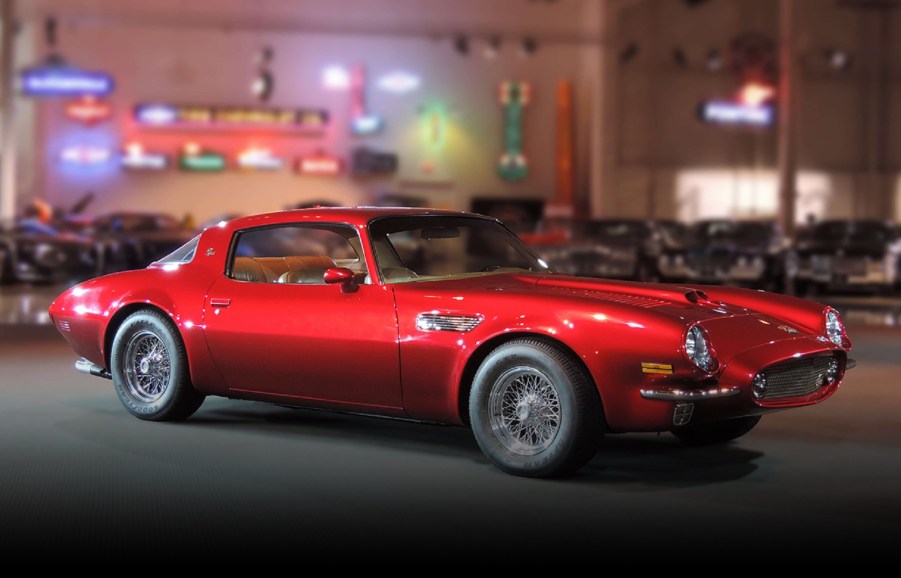
The 1-of-1 Pontiac Pegasus: A Firebird With a Ferrari Daytona V12
‘Previewing the future’ is perhaps the best way to sum up concept cars’ job descriptions. Although the concept itself might not get built, it often shows the direction a brand is headed. However, because concepts aren’t bound by road regulations, designers are free to run a little wild. And sometimes, they go a lot wild, which is what happened with the Pontiac Pegasus.
The Pontiac Pegasus is the rarest Firebird concept with a crazy backstory

In 1970, Pontiac was gearing up to release the second-gen Firebird muscle car. And at the same time, Chevrolet was in the middle of redesigning the Camaro, MotorTrend reports. One GM stylist, Jerry Palmer, thought the Chevy would benefit from some extra European flavor. Specifically, design elements from the 1958 Ferrari 250 Testa Rossa race car, The Drive explains.
When Palmer finished sketching this Cama-Rossa, he showed it to GM’s Design Vice President, Bill Mitchell. And Mitchell loved it. He so loved it that he took it off of Palmer and brought it over to Pontiac, which was GM’s performance brand at the time. Once there, he tweaked the design a bit, and turned it into “a test bed of design elements” for the second-gen Pontiac Firebird, Hagerty says. And once that was done, Mitchell turned the sketch into a real car: the Pontiac Pegasus.

The Pontiac Pegasus is built on a 1970 Firebird chassis, GM Authority reports. And it has several GM components, including the rear axle and four-wheel disc brakes from the contemporary Corvette. Incidentally, it wasn’t until the 1979 Trans Am that the Firebird even had optional four-wheel discs, Hagerty reports.
However, the Pontiac Pegasus doesn’t hide its Ferrari design elements. Unlike the standard Firebird, it has Borrani wire wheels. And the Pegasus’s fender vents, grille, and front end also recall contemporary Ferraris. Plus, it even has a Ferrari exhaust system and instrument panel.
Those last two parts aren’t an homage, though. The Pontiac Pegasus needs them because of what’s under its hood.
It doesn’t just have the look—the Pontiac Pegasus has a Ferrari Daytona heart

In the early ‘70s, Pontiac offered the Firebird with a variety of six-cylinder and V8 engines. The 1970 Trans Am, for example, had a 6.6-liter V8, Automobile reports. But for the Ferrari-influenced Pontiac Pegasus, that simply wouldn’t do.
It’s unclear how, but Mitchell somehow managed to get ahold of the 4.4-liter V12 from the Ferrari Daytona, aka the 365 GTB/4. Per The Drive and GM, Enzo Ferrari himself contributed the engine to the concept. Considering the Ferrari Daytona has 352 hp and goes 0-60 mph in 5.2 seconds, Car and Driver reports, it was a welcome contribution.
Originally, the Pontiac Pegasus was supposed to use a three-speed GM automatic. But to quote The Drive, the automatic “didn’t play nice with the high-strung Ferrari V12.” So instead, the Pegasus has a Ferrari five-speed manual.
Could you make your own version?

Today, the Pontiac Pegasus resides in the GM Heritage Center, which is where I first saw it several years ago. However, Mitchell regularly drove and even raced it back in the day, The Drive reports. And from what I can tell, GM does fire it up from time to time.
But does the Pontiac Pegasus have to remain a 1-of-1 museum piece? Could an enterprising enthusiast make their own, perhaps? Theoretically, it’s not impossible.
Because the Pegasus is a Firebird design ‘test bed,’ it has some design elements seen on later models. For example, the wrap-around rear window started appearing on Firebirds in 1975, Hagerty reports. And according to Hagerty, you can get a non-Trans-Am example for less than $20K.
The Ferrari design elements and Daytona engine are the trickier parts, not least of which is swapping in the engine. The Pegasus needed a custom hood and firewall to accommodate that 4.4-liter V12. And it has no room for an A/C compressor.
However, Ferrari restoration shop GTO Engineering sells a 250 Testa Rossa recreation and now has its own V12 engine. So, the necessary parts are technically available. This is useful because an original Ferrari Daytona easily goes for over $500K, Hagerty reports.
Follow more updates from MotorBiscuit on our Facebook page.


